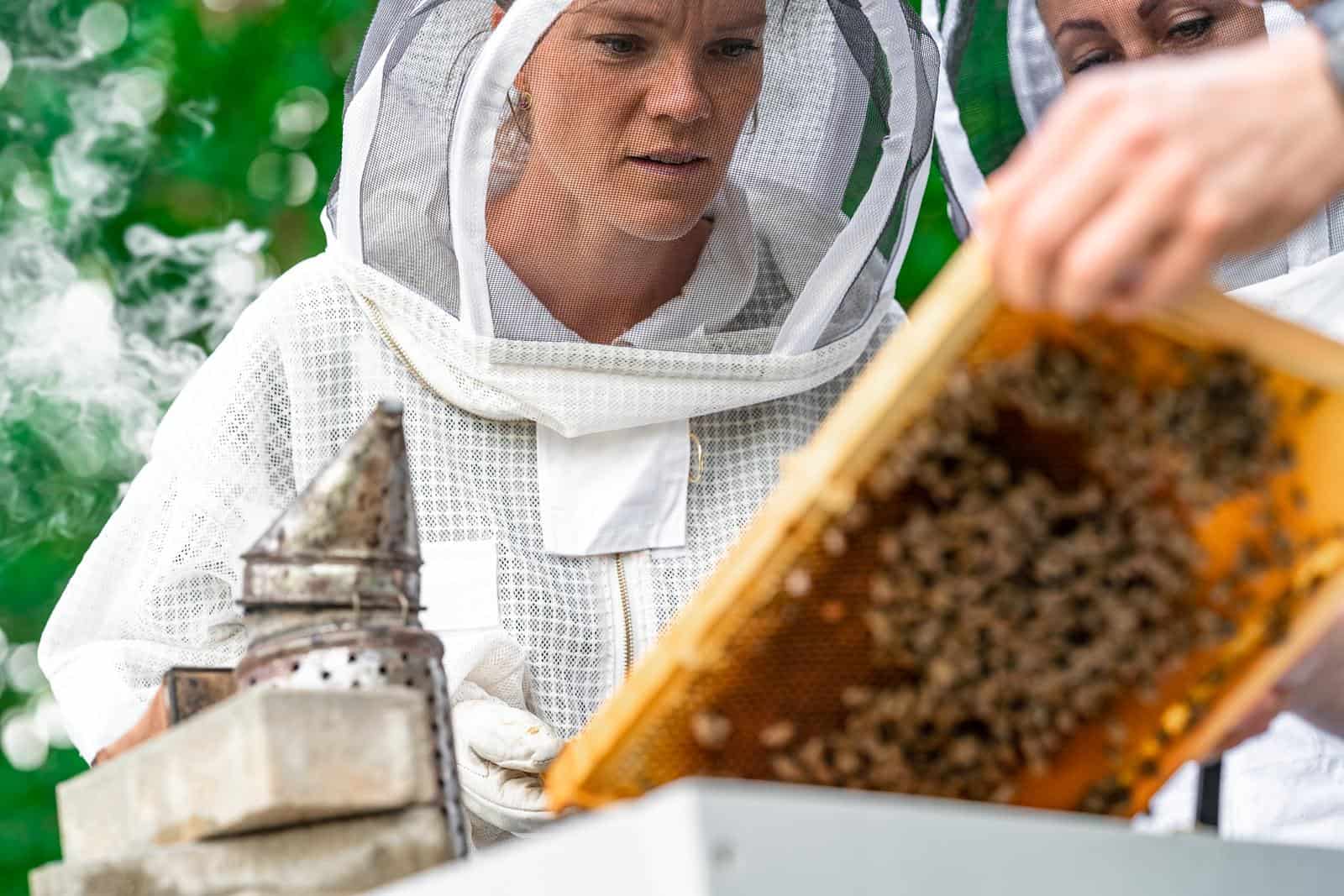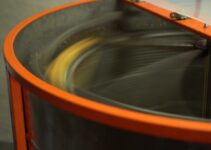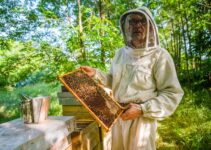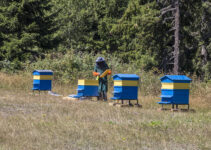If beekeeping has captured your attention and you would like to start keeping bees, it would be good to have a plan to help you get started the right way. What is the best way for a beginner to get started in beekeeping and avoid frustrating mistakes?
Beekeeping is farming with bees and requires the right knowledge, equipment, and a plan for getting started. Knowing your local laws, when to start beekeeping, the equipment you need, and how to find expert advice when you need it is crucial to succeeding as a beekeeper.
Beekeeping is not a hobby or activity that you can jump in and hope for the best. It would help if you had a plan to start beekeeping in an organized, effective, and safe manner. Bees require care and maintenance, which in turn requires the right equipment and knowledge to care for them properly.
Getting Started As A Beekeeper
Starting out beekeeping is an activity that requires research and planning, but your effort will be well rewarded!
Taking the time to start beekeeping the right way will improve your chances of success and increase your enjoyment derived from keeping bees!
The plan you implement to start beekeeping should include the following steps to ensure you have all your bases covered and set your path to success as a beekeeper.
1. Beekeeping As A Hobby Or Income Generating?
Whether you are starting out as a hobbyist or with the intention to grow your beekeeping into a business, the beginning should be the same.
We recommend that people who want to use beekeeping to generate an income start on a smaller scale, similar to a hobbyist, to make the learning process easier.
Once you have the basics down with a few hives, you have the knowledge and skills to successfully expand your operation without it becoming an overwhelming experience.
Whatever your final goal is for your beekeeping, we recommend that you start with 2 hives to learn the ropes and find your beekeeping groove.
2. When Should You Start Beekeeping?
When is the best time to get started beekeeping? Bee colonies have a seasonal cycle, which makes it important to start beekeeping at the right time of year.
The best time to begin beekeeping is in the early spring or as early as possible in the summer. Starting too late in the summer can result in the colony overwintering poorly. Starting beekeeping in the fall or winter should not be attempted.
We have an article called “Can I Start Beekeeping In The Summer?” which is dedicated to this topic if you would like to read more detail regarding why the time of year to start beekeeping is important.
The part of starting beekeeping that you can initiate in the fall or winter is everything short of getting your first bee colony.
This way, you can be prepared to take ownership of your first colony in the early spring or early summer.
3. Check Your Local Beekeeping Laws
Before you go ahead and buy equipment and get a colony, you must investigate the local laws about keeping bees in your area.
The local laws may limit aspects such as where you may keep bees, how many colonies you can keep, and even the manner in which you may source a new bee colony.
If you have checked with your local municipality, and they have no specific bylaws regarding beekeeping, then the general beekeeping laws of your state will apply.
As a beekeeper, you must comply with the state legislation and local bylaws that govern the keeping of bees in your area.
The best and easiest way of finding these restrictions is to join a local beekeeping association, leading us to the next point.
4. Join a Beekeeping Association
A local beekeeping association consists of a group of people from your area who have beekeeping skills and can help you get started by offering advice and assistance.
Beekeeping associations have members with a wide range of experience, from newbies like yourself to seasoned beekeepers.
The experienced beekeepers are generally more than willing to help new beekeepers get started and will give you invaluable, locally relevant beekeeping advice for your region.
The beekeeping association can inform you of the local beekeeping laws and help you implement beekeeping strategies and maintenance routines that will keep you within the law.
Many associations also offer beginner beekeeping courses for their members to give them the basic foundational knowledge to get started as a beekeeper.
5. Get The Right Gear To Start Beekeeping
Beekeeping is a fairly gear-intensive activity, so you must ensure you get the right, quality gear rather than compromising on low-quality gear.
The advantage of beekeeping gear is that most of the equipment is robust and can last you for many years before requiring replacement.
Never compromise on safety when dealing with bees; they can be unpredictable and dangerous to the point of being life-threatening.
The following gear is the minimum recommended for beginner beekeepers.
- Beekeeping suit. A full suit is recommended for beginners until you feel comfortable working in a beehive.
- Beekeeping boots. Beekeeping can be a messy business, requiring dedicated boots. A good set of boots will protect your feet and ankles from stings.
- Beekeeping gloves. A pair of quality beekeeping gloves will give you confidence when working inside a beehive and protect your hands from stings.
- Bee smoker. A smoker is an important piece of equipment used to calm the bees when you open the hive.
- A hive tool. A hive tool is used to level beehives open to break the propolis seal the bees have put in place and to lift frames from the hive for inspection or harvesting.
- Bee brush. A soft-bristled brush to gently brush bees off frames and hives during beekeeping operations. These brushes are designed not to injure the bees while brushing them off.
There are other tools a gear that you can get for beekeeping, but they can wait until you have a little more experience. This list is the minimum tools you need to get started.
Other tools will be required for harvesting and maintenance, but they can be purchased slowly on an as-needed basis.
You are now prepped and ready to start beekeeping! All you need is a hive and some bees!
6. Get Your First Bee Colony
There are some options for obtaining your first bee colony, but some require the help of a seasoned beekeeper.
At this time, you must choose the beehive style you want to use to keep your bees. I recommend a Langstroth hive for beginners because they are easy to work with and perform hive inspections.
You will need a hive with 1 brood chamber and 2 honey supers to get started with enough housing for your colony.
The two main ways to get a bee colony are to trap a wild colony or purchase an established colony. I recommend purchasing an established colony from a known source, preferably from someone who is a member of the same beekeeping association.
Some regions have regulations regarding where your purchased bees can be sourced from, and buying from a local beekeeper often comes with valuable after-sales service from the seller.
An established colony will overwinter better in your first beekeeping season and give you a smoother introduction to beekeeping with minimal issues.
Conclusion
Beekeeping can be kept low-key as a rewarding hobby or a full-time career, but either way, the best way to begin beekeeping is to keep it small and grow into keeping bees on a larger scale. Start your beekeeping right, and you can have a flourishing apiary in your first year of beekeeping!
Do your research and never stop learning about your bees. Speak to other beekeepers and join a beekeeping association where you can get expert advice and possibly a mentorship with an experienced beekeeper from your area.
References
Writer’s personal experience
https://www.countryliving.com/home-maintenance/a26986625/beekeeping-for-beginners/
https://www.thespruce.com/beginners-guide-to-beekeeping-3016857
https://www.bhg.com/gardening/design/nature-lovers/beekeeping-for-beginners/




